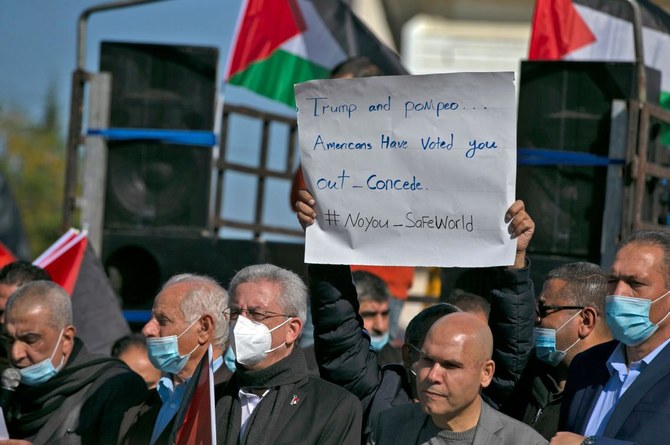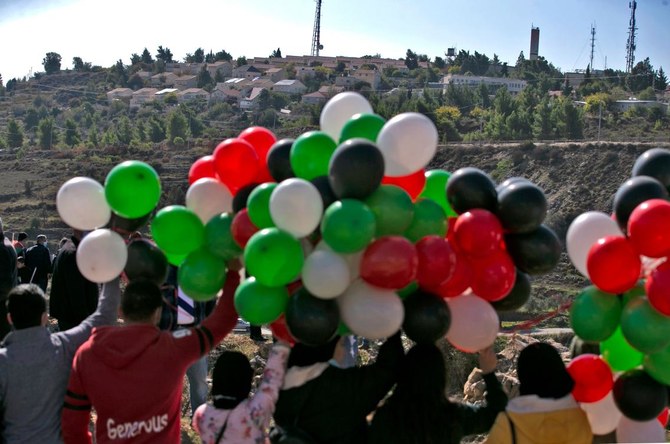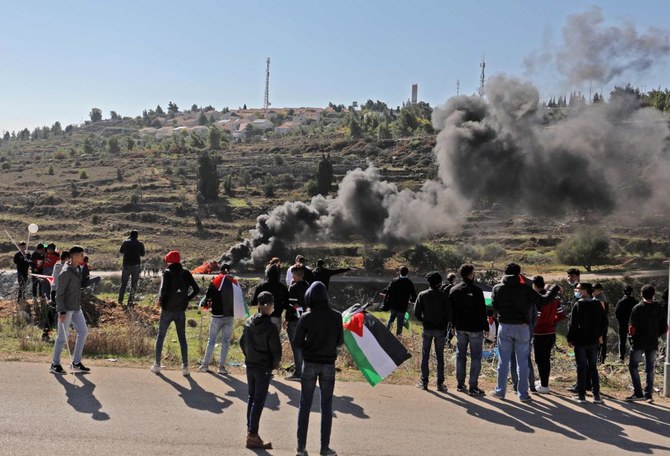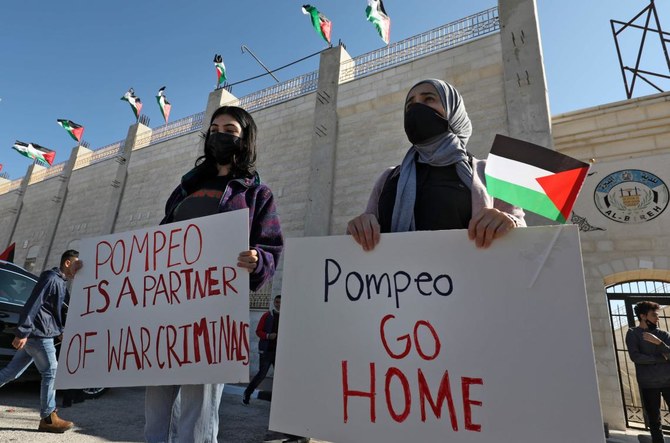AMMAN: A group of US citizens from Al-Bireh in Palestine have protested against US Secretary of State Mike Pompeo’s visit to Psagot, an Israeli settlement.
Former Al-Bireh mayor Abdel Jawwad Saleh was part of the protests, and told Arab News that the settlement “was built on citizens rightfully owned private property.”
The American-Palestinian group said in an open letter to Pompeo obtained by Arab News that they are the “legal property owners and titleholders of the land where the Israeli settlement of Psagot is built.”
The land was initially confiscated by the Israeli army for security purposes and later handed over to Israeli settlers.
Saleh, the 89-year old former mayor, lost seven dunums as part of Israeli settlement efforts. He directed harsh criticism at Pompeo, saying: “This is the land of our forefathers that your friends stole. You may drink the wine of this settlement but its grapes are the blood of Palestinians.”
The outgoing Trump-era official made an unprecedented and controversial visit to a Psagot winery that last year renamed one of their brands after Pompeo in a “show of gratitude.”
The American-Palestinian group said they “will not stop efforts to return our private property.” They also labeled Pompeo “a secretary of state not fit for office,” adding that they will pursue legal action and “hold him accountable for his actions that are facilitating the theft of private property of US citizens abroad.”
Anis F. Kassim, publisher of the Palestine Yearbook, told Arab News that Pompeo’s visit to Psagot is “an act of aggression against Palestinian rights.”
He said: “By endorsing the settlement structure and apartheid system that Israel is building in historical Palestine, the US is endorsing robbery of Palestinian land.”
Kassim called the US action “repugnant” to customary and conventional international law. “The Hague regulations and Geneva Conventions prohibit pillage by an occupying power,” he said.
In addition to the West Bank settlement visit, Pompeo plans to travel to the occupied Golan Heights that Israel annexed in 1981. In a deeply controversial move last year, the Trump administration formally recognized Israeli sovereignty over the occupied region.
Oraib Rantawi, director of the Amman-based Al-Quds Center for Political Studies, told Arab News that Pompeo’s visit is a “continuation of an attempt to normalize and legitimize settlements,” and could lead to the US “recognizing the annexation of larger settlements.”
Rantawi labeled the Trump administration’s visit as “part of gifts to the Israelis and their Zionist supporters in the US.”
Jordanian political activist Zaid Nabulsi said that the Golan Heights are “Syrian occupied and Syrian territory, regardless of what US officials say or do.”
Suhail Khalileh a settlement expert, said that the actions of any country that contravene international law and UNSC resolutions would normally be ignored.
“Khalifeh said that during the Biden era much of these actions will be referred.
“We feel that there is a huge campaign going on between the US and Palestine on the political progressive level as well as on the level of universities and municipalities.”
Ali Abunimah, one of the founders of the BDS movement, also commented on attempts by Pompeo to link the movement to antisemitism.
“This desperate tactic is a last gasp effort from a defeated administration to give Israel’s apartheid regime a parting gift. It will in no way affect the determination of Palestinians to campaign and struggle for their rights,” he told Arab News.
US-Palestine nationals denounce Pompeo visit
https://arab.news/yubuq
US-Palestine nationals denounce Pompeo visit

- Pompeo made a controversial visit to a Psagot winery that last year renamed one of their brands after him
- The American-Palestinian group said they “will not stop efforts to return our private property”
Israel strikes southern Syria: state media, monitor

“Israeli occupation jets launch air strikes targeting the surroundings of Daraa city,” said Damascus’s official news agency SANA, without immediately providing further details.
The Syrian Observatory for Human Rights monitor said Israel targeted a military site once belonging to ousted president Bashar Assad’s army but now used by the forces of Syria’s new authorities.
The Britain-based Observatory reported that a fire broke out, with ambulances rushing to the scene amid reports of casualties.
Since Assad’s overthrow in December, Israel has carried out hundreds of air strikes in Syria and deployed troops to a UN-patrolled buffer zone on the strategic Golan Heights.
Israeli Defense Minister Israel Katz said the air force conducted a strike on Damascus on Thursday, with the military saying it had hit a “command center” of the Palestinian Islamic Jihad group.
The Observatory reported one fatality in that strike, with SANA saying it targeted a building in the capital.
The Israeli military said the “command center was used to plan and direct terrorist activities by the Palestinian Islamic Jihad” against Israel.
A source in Islamic Jihad said a building belonging to the group had been hit by Israeli jets, adding there were “martyrs and wounded” in the strike.
Ismail Sindawi, Islamic Jihad’s representative in Syria, told AFP the targeted building had been “closed for five years and nobody from the movement frequented it.” Israel was just sending a message, Sindawi said.
Even before Assad’s fall, during the Syrian civil war that broke out in 2011, Israel carried out hundreds of strikes in the country, mainly on government forces and Iranian-linked targets.
Jordan’s FM says Syria’s reconstruction must preserve security, unity

- Ayman Safadi met his Syrian counterpart on the sidelines of an international conference in Brussels
- Ties between Amman and Damascus have improved since the fall of the Assad regime
LONDON: Jordanian Foreign Minister Ayman Safadi met his Syrian counterpart, Asaad Al-Shaibani, in Brussels on Monday on the sidelines of an international conference to support Syria’s political transformation.
Ties between the neighboring countries have improved since the fall of the Bashar Assad regime in December. Interim president of the Syrian Arab Republic, Ahmad Al-Sharaa, visited Amman in late February.
In Brussels, the ministers discussed the most recent developments in Syria. Safadi said that Jordan supports Syria’s reconstruction on the basis of preserving its security and unity while protecting the rights of Syrians, the Petra agency reported.
On Monday, the EU hosted the ninth international conference to support Syria. Representatives from the new interim government were invited to attend for the first time, including Al-Shaibani.
The event aims to bolster international support for Syria’s transition and recovery following more than 13 years of civil war.
Palestinian detainees ministry warns of virus outbreak in Israeli Megiddo Prison

- 90 percent of prisoners have suffered from diarrhea and vomiting in the past 10 days
- Ministry accuses Israel Prison Service of medical negligence for not providing adequate treatment
LONDON: The Palestinian Authority warned on Monday of a virus outbreak among Palestinian prisoners in Israeli jails that could severely affect their health and well-being.
The PA’s Ministry of Detainees and Ex-Detainees Affairs reported that prisoners in Megiddo Prison in northern Israel have been suffering from diarrhea and vomiting in the past 10 days. It reported that nearly 90 percent of the prisoners experienced these issues, and some lost consciousness due to the severity of the illness, particularly among the elderly.
The ministry accused the Israel Prison Service of medical negligence for not providing adequate treatment. Megiddo Prison is the second-largest Israeli prison, following the notorious Negev Desert Prison.
Since October 2023, the ministry has recorded the deaths of 53 Palestinian prisoners in Israeli jails, with the most recent being Moataz Abu Zneid from Dura, south of Hebron, in the occupied West Bank.
By the end of December, Israel had detained 9,619 Palestinians, including 2,216 from the Gaza Strip. However, Tel Aviv released around 600 Palestinians in a ceasefire and captive exchange deal with Hamas in early 2025.
EU vows 2.5 bn euros to help Syrians after Assad ouster

- For the first time, the Syrian authorities were represented at the annual conference in Brussels
- Outbreak of deadly violence this month has rocked confidence in the new authorities
BRUSSELS: The EU led the way on pledging aid for Syria on Monday at a donor drive in Brussels — but the call for funding to help the war-torn country after Bashar Assad’s ouster risked falling short of last year as US support dries up.
Western and regional powers are desperate to steer Syria onto the road to stability after 14 years of civil war that have sent millions of refugees over its borders.
For the first time, the Syrian authorities were represented at the annual conference in Brussels — with interim foreign minister Assaad Al-Shibani attending.
But an outbreak of deadly violence this month — the worst since Assad was toppled in December — has rocked confidence in the new authorities.
European Commission head Ursula von der Leyen said Brussels was stepping up its commitment for this year and next to almost 2.5 billion euros ($2.7 billion) to help those in Syria and neighboring countries.
“Syrians need greater support, whether they are still abroad, or they decide to go home,” she told the Brussels conference.
The vow from Brussels came on top of significant contributions from individual countries, including some $330 million from Germany and $210 million from Britain.
Last year’s donor drive raised 7.5 billion euros in grants and loans to help the people of Syria. The overall total for this year will be announced later Monday.
Efforts to top that level this time around look set to be hit by US President Donald Trump’s axing of Washington’s foreign aid budget.
Up until now, the United States has been the single biggest individual donor to fund humanitarian efforts in Syria, according to the United Nations.
Syria’s new rulers have been clamouring for assistance to help the country’s recovery.
The EU has eased sanctions on key sectors of the economy, but along with other powers it insists the authorities must make good on promises for an inclusive transition.
“We do appreciate the major measures taken by the European Union, such as the lifting or suspending of the sanctions,” Shibani said.
“However, these measures did not live up so far to our expectations. We want further measures in order to help us secure our recovery.”
There have been positive moves from Damascus, including Sharaa signing a constitutional declaration laying out a five-year transitional period, and rights for women and freedom of expression.
But hopes were shaken by the violence on Syria’s Mediterranean coast, which a war monitor said saw security forces kill nearly 1,500 civilians, most of them members of the Alawite minority to which the Assad family belongs.
Shibani insisted that the new authorities would bring to justice “anyone who perpetrated any crime, whose hands are stained with blood.”
“We believe in the true sense of citizenship, the citizenship of every single citizen of Syria, regardless of their ethnicity or religion,” he said.
The EU has held its annual donor drive for Syria for the past eight years but it mainly focused on supporting refugees in neighboring countries and avoided any contacts with the Assad regime.
Syria’s needs are massive as swathes of the country lie in ruins and the economy has been ravaged by years of international isolation after Assad’s 2011 crackdown on opposition sparked the civil war.
The country still faces a dire humanitarian situation, with an estimated 16.7 million people in need of assistance.
“It would be a mistake to disinvest from Syria now,” said Mirjana Spoljaric, president of the International Committee of the Red Cross.
“Humanitarian aid remains a lifeline that millions of Syrians depend on. Severing it now would only deepen their suffering and prolong the country’s recovery,” she said.
The United Nations says that, at current growth rates, Syria would need more than 50 years to get back to its economic level before the outbreak of the war.
King of Jordan discusses Gaza, regional development with Italian president, PM

- King Abdullah highlighted Italy’s vital role in Gaza’s humanitarian assistance and airlift efforts
- He warned about escalating tensions in the occupied West Bank and violations of holy sites in Jerusalem
LONDON: King Abdullah II of Jordan met with Italian President Sergio Mattarella at the Quirinal Palace in Rome on Monday to discuss regional developments.
King Abdullah stressed the need for a ceasefire in the Gaza Strip and highlighted Italy’s vital role in humanitarian assistance and airlift efforts carried out by Jordan, Petra reported.
He affirmed that Jordan supports the reconstruction of Gaza without the displacement of its residents and warned about the escalating tensions in the occupied West Bank and violations of holy sites in Jerusalem.
During the meeting attended by Qais Abu Daieh, the Jordanian ambassador to Rome, and Alaa Batayneh, the director of King Abdullah’s office, Mattarella and the Jordanian monarch reviewed their countries’ friendly relations.
The king also met with Italian Prime Minister Giorgia Meloni on Monday, during which he stressed that a two-state solution was essential for regional stability.

Discussions with Meloni covered Jordan-Italy cooperation, Syria’s stability, and Lebanon’s security.
Meloni reaffirmed Italy’s support for Jordan’s role in promoting peace in the Middle East. The meeting was also attended by Batayneh.























